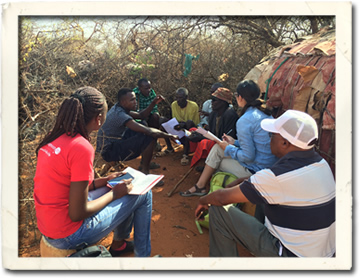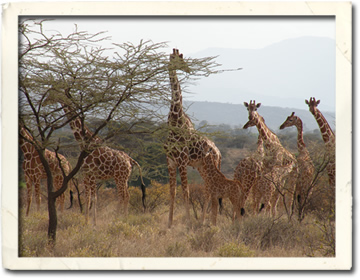The Program
 Required courses and meetings for the IRES program are mandatory, and will provide opportunities to engage in research with scientist mentors and prepare a research proposal on a topic of social-ecological interest to be investigated in Kenya. The summer field experience in Kenya will be built upon the strong foundation of coursework, meetings and cohort-building activities that will come together to prepare students for the most rewarding experience possible, both personally and professionally. This program has been designed specifically to enhance the education and lives of the five students who are selected to participate.
Required courses and meetings for the IRES program are mandatory, and will provide opportunities to engage in research with scientist mentors and prepare a research proposal on a topic of social-ecological interest to be investigated in Kenya. The summer field experience in Kenya will be built upon the strong foundation of coursework, meetings and cohort-building activities that will come together to prepare students for the most rewarding experience possible, both personally and professionally. This program has been designed specifically to enhance the education and lives of the five students who are selected to participate.
Students accepted into the EA-IRES program with majors in CSU’s Department of Ecosystem Science and Sustainability may be eligible to apply their EA-IRES placement to meet a portion of their major requirements, specifically NR 220: Natural Resource & Ecology Measurements. Student should consult the ESS Substitution Policy for NR 220 and make an appointment with their ESS Academic Success Coordinator for more information.
Students will be expected to participate actively with their cohort throughout the program; complete all program academic and research requirements; follow all health and safety protocols; and create and present a poster and stakeholder report on their work after traveling to Africa. Participation in the program is contingent on following University and program protocols and meeting program deadlines.
FALL 2017
In the fall of 2017, fellows will register for the SUPER program "Skills for Undergraduate Participation in Ecological Research" (ESS 220 - 1 credit), and a seminar class on African Dryland Social-ecological Systems that was created specifically for EA-IRES Fellows (ESS 495 - 1 credit). The program lead will organize occasional meetings for the students to get to know each other, to set personal and professional goals for the year, and to begin talking about potential research projects for Summer 2018's field experience in East Africa.
Spring 2018
In the spring of 2018, fellows will continue with the SUPER program (ESS 221-1 credit), and will be mentored through the proposal-writing process (ESS 298-1 credit). They will also attend occasional meetings focusing on team-building, logistics and preparation for travel to East Africa. Some of these meetings may be held early in the morning so that University of Nairobi faculty may participate via Skype.
 Summer 2018
Summer 2018
The program in East Africa will build directly on the fall and spring semesters and will take place in either Kenya or Tanzania with the assistance of up to three faculty partners/mentors from University of Nairobi. Students will travel as a group, and collaborative work will be encouraged. We will have multiple field trips to protected areas and to speak with individuals who work in African drylands with both ecosystems and people. Fellows must register for a minimum of 1 credit for the summer research experience (ESS 495), and may receive up to 5 credits for the program. Please see FAQs for more information. In addition, the EA-IRES program leads are working to fund five University of Nairobi students to join the field program, but this is dependent of funding and a parallel training and proposal-writing program at UoN.
Fall 2018
While no courses will be required in the fall of 2018, IRES students may register for one follow-up credit (ESS 298) to continue work on their data from the summer field experience. All students WILL be required to present their results in poster form in Fall 2018 and/or Spring 2019, and to contribute to a group stakeholder report that will be delivered to communities. They will also be encouraged to present at the Front Range Student Ecology Symposium (http://ecosym.ecology.colostate.edu, Feb 2018), the Celebrate Undergraduate Research and Creativity showcase (http://curc.colostate.edu, April 2018), the Ecosystem Science and Sustainability Symposium, or other appropriate professional venue on or off campus.
In Spring 2017, two of our 2015-16 fellows won the Warner College of Natural Resources College-wide undergraduate research award (congratulations Ashley Foster and Sara Hines!), two 2015-16 fellows won university-wide CURC awards for Social Justice (congratulations Sara Hines!) and Service Learning (congratulations Holly Cox!), and one 2016-17 fellow won a University-wide CURC award for Warner College of Natural Resources (congratulations Hannah Dresang!). This is amazing representation of our program at CSU's research award ceremonies! All students will be eligible to apply for a scholarship to present at the Spring 2018 National Council for Undergraduate Research as well. Four of our Fellows applied to present oral presentations at NCUR in Memphis 2017, and all four did an amazing job!